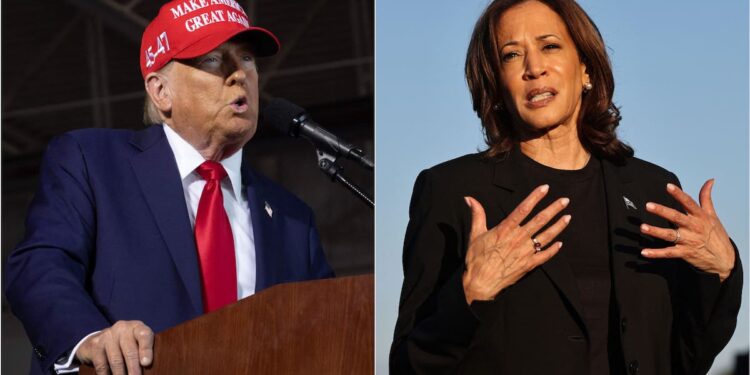A month before the presidential election, Donald Trump and Kamala Harris went blow for blow on Sunday, calling each other “incompetent” or “full of lies”, as the race for the White House enters its final stretch.
• Also read: Trump assures that he will “never” give up, despite assassination attempts
• Also read: Biden worries about the risk that the US presidential election will not be “peaceful”
Guest of the very popular podcast Call Her Daddyto the largely female audience, the Democratic vice-president resumed her denunciation of violence against women and defended the right to abortion, in particular, pointing out the “lies” of Donald Trump, who accused her of being in favor of the “execution of babies” in the eighth or ninth month of pregnancy.
“It is scandalously inaccurate and insulting to suggest that this is happening, that women are doing this. This man is full of lies,” she insisted.
While the Republican candidate repeatedly tried to pose as a “protector” of women during his campaign, Mme Harris recalled that “this is the same one who said women should be punished for having abortions.”
Abortion is one of the major subjects of the campaign, which the Democrats intend to take advantage of, while the ex-president tries to avoid taking a clear position, defending the fact that it is the States which must decide.
This podcast marked the first step in a media marathon that will bring Kamala Harris to speak, throughout the week, on various prime-time television and radio shows, including evening shows, such as The Howard Stern Show Or The Late Show with Stephen Colbertconsidered generally supportive of his campaign.
“Grossly incompetent”
For his part, Donald Trump traveled for the fourth time to Wisconsin, one of the key states, for a rally in the small town of Juneau, where he rolled out his usual campaign themes, from immigration control to reducing inflation through taxation, and once again accusing his rival of wanting to pursue a “communist” policy.
But the ex-president went further, judging Mme Harris “grossly incompetent”, taking as an example the lack of federal response, according to him, to help the populations of the southeastern United States who were hit hard by the hurricane Helene.
“This is someone who will steal your fortune and abandon you and your family when the waters rise,” he summed up.
In front of several hundred people, the Republican candidate recalled that early voting was open in Wisconsin: “I only ask you one thing, go out and vote.”
Donald Trump lost Wisconsin in 2020 to Joe Biden. Sunday, he was there for the fourth time in eight days, the day after a triumphant return to Butler (Pennsylvania), where he narrowly escaped an assassination attempt on July 13.
Key states at the center of the campaign
Opinion polls show the two candidates neck and neck, fueling a frantic race to try to convince every voter in the seven so-called “key” states that will decide the outcome of the November 5 election.
The indirect universal suffrage voting method means that in the United States, the presidential election is not decided by the votes cast throughout the country, but by those of electors whose number varies depending on the state.
Thus, from Michigan to Arizona via Nevada, Wisconsin, Pennsylvania, Georgia and North Carolina, the key states where Donald Trump and Kamala Harris are focusing their campaigns, victory should be decided by a few dozen thousands of votes.
Vice-President Harris was in Wisconsin on Thursday, in Ripon, where the Republican Party was born, and she appeared with Republican Liz Cheney, a figure of the anti-Trump right.
Kamala Harris will also campaign in the western states of Nevada and Arizona.
In the meantime, she will be able to count on strong support in the person of Barack Obama.
Still very popular, the first black president in the history of the United States will visit several key states between now and the vote, starting Thursday with Pittsburgh, the industrial bastion of Pennsylvania, a state more than ever essential for these elections.
At 63, Barack Obama remains one of the most influential voices in the Democratic electorate and has already raised more than $76 million in campaign funds this year. But he had not yet set foot on the countryside.



